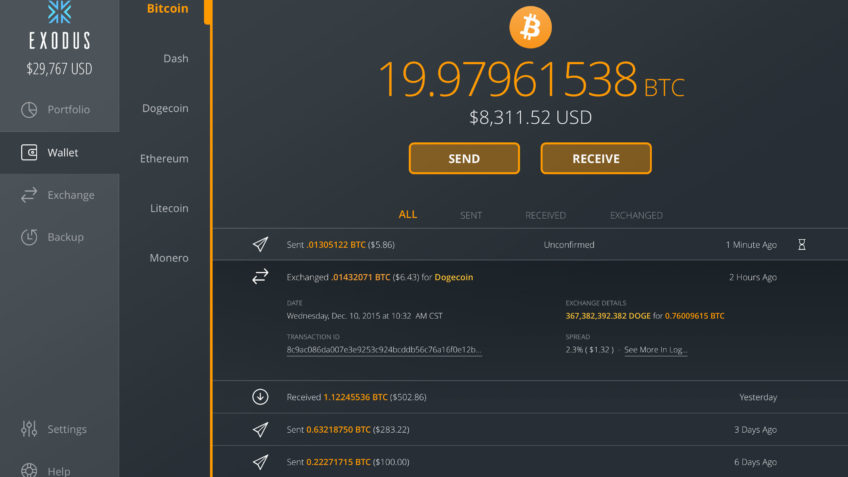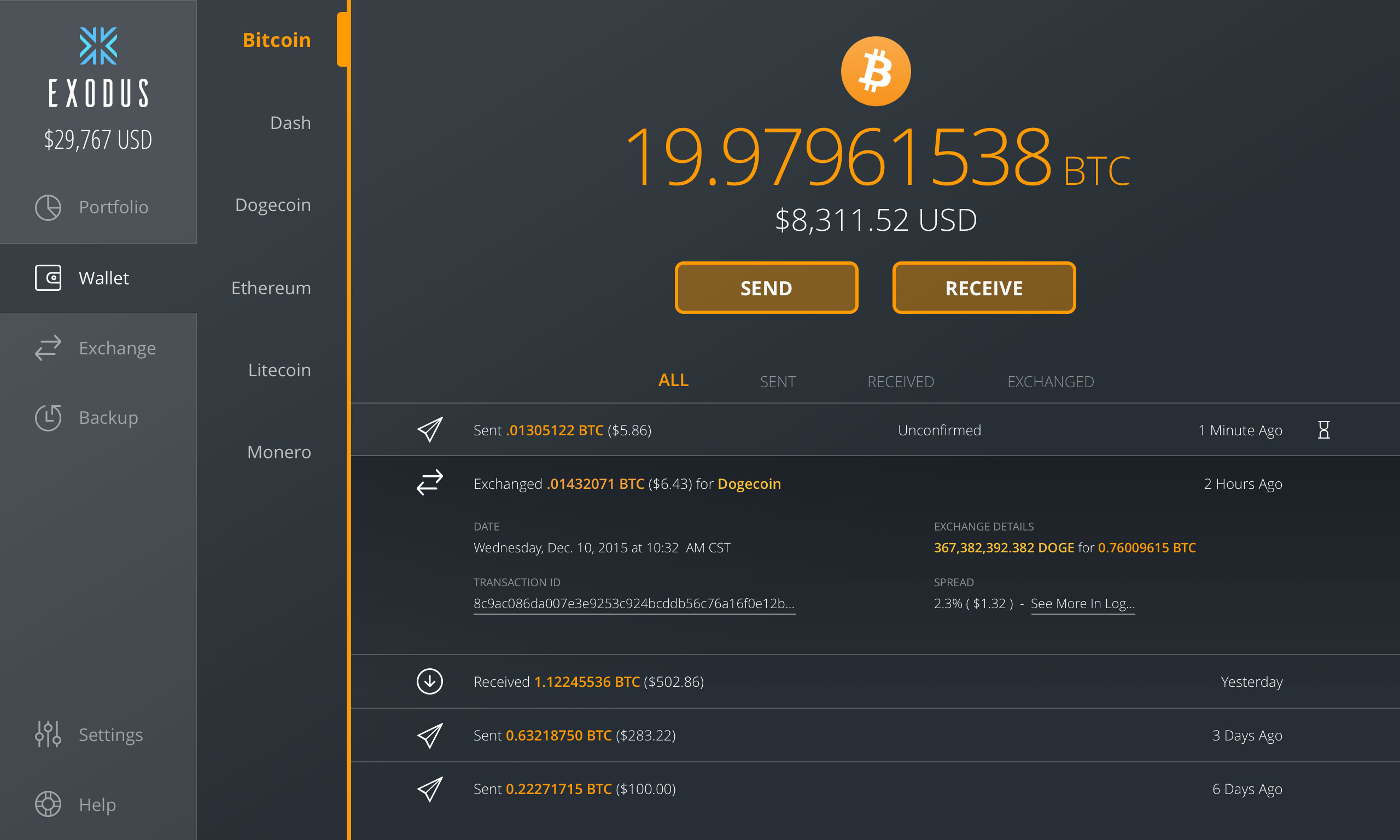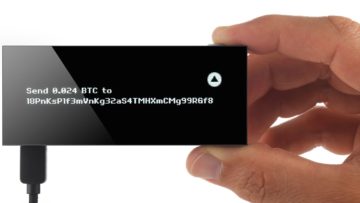Exodus is one of the newer options allowing you to store your own cryptocurrency – and a software wallet that provides a client interface which lets you access and transfers your crypto holdings.
This makes Exodus more risky to use than hardware wallet alternatives (Trezor, Ledger, etc.). The good thing is that Exodus lets you store several coins in the wallet including Bitcoin, Dash, Ethereum, Litecoin, etc. The list of supported coins is longer and longer as new coins are constantly being developed.
This is one of the few desktop wallets that can store more than one cryptocurrency. This means that you have a chance to diversify your portfolio easily. It has a very simple interface and it’s very easy to use. The only thing that might be an issue is the constant connection to the internet. Although it doesn’t save your keys in order to keep it more secure, it is, however, less secure than a hardware wallet.
The wallet can provide you with a high degree of anonymity since no personal information is required to download, use and install. It also does not collect personal information and private keys so they are always in full control of the users themselves. The public keys and transactions that are made with the wallet can be seen on the blockchain and there are no available features that hide the transaction trail.
The wallet also offers support for privacy coins as well.
Users can use the 12-word recovery seed phrase in order to restore the wallet if your device gets destroyed, lost or stolen. This means that you can choose the restore wallet option in your new device and download your wallet as it was in the first device. Exodus provides support via email but there are plenty of other, updated ways that you can get the support you need.













MrTrinita - April 10, 2018 @ 18:34
Version 1.47.1
User Friendly and Support a lot of CriptoCurrency and Now a lot ERC20 tokens.
Great Product
Mario - April 27, 2018 @ 14:17
did an exchange in my exodus wallet from bitcoin to bitcoin cash two days ago with $50usd from btc to bch and when I went into my exodus wallet to do another exchange today in the same amount the exodus now has a red message saying that you must have a minimum to exchange in the amount of 0.013279. This must be new. I also was working with them on a previous issue where $1500usd is missing from my exodus that were sent to two other wallet addresses which I did not send to. I’m disappointed in them. I will now look for another wallet. Any suggestions? Thank you
did an exchange in my exodus wallet from bitcoin to bitcoin cash two days ago with $50usd from btc to bch and when I went into my exodus wallet to do another exchange today in the same amount the exodus now has a red message saying that you must have
statebot - October 28, 2018 @ 11:02
My Exodus wallet was hacked, and I will NEVER use this shit again! All my assets is now gone, nothing left. This is not the first time this wallet has been hacked.
Zaraustra - October 28, 2018 @ 11:03
Exodus is easy to use from my computer with nice interface and good support!
Flame returns - October 29, 2018 @ 22:42
Not a bad wallet, stubborn team.
raypto - October 29, 2018 @ 22:43
It is the best wallet I have found. Superb portfolio display giving real time value of your crypto currency in both Bitcoin value and your chosen currency. They support many coins.
From a newby point of view it is a bit daunting to join Exodus because the first thing you do is send them coins, you don’t actually open an account with them before you send coins. However once your coins have successfully been received they take you stage by stage through the account set up and security measures.
It is a very user friendly website and any interaction with the support people is answered quickly and in detail.
In the crypto world i would prefer 2fa login.
It is the best wallet I have found. Superb portfolio display giving real time value of your crypto currency in both Bitcoin value and your chosen currency. They support many coins.
From a newby point of view it is a bit daunting to join Exodus becaus
Ampolla - November 1, 2018 @ 22:19
They have HD wallet, but at the end of the day you are trusting them with your keys.
zerocrypted - November 1, 2018 @ 22:20
Well, this could be the perfect wallet for holding a few cryptocurrencies there.
It could be. But its not. Everything’s awesome at it – but they don’t have a 2FA. How you can’t have a 2FA in 2018? I so wanted to give them 5 stars, but only 4 for the moment.
Well, this could be the perfect wallet for holding a few cryptocurrencies there.
It could be. But its not. Everything’s awesome at it – but they don’t have a 2FA. How you can’t have a 2FA in 2018? I so wanted to give them 5 st
Cliff - November 8, 2018 @ 22:02
The Exodus wallet crash recently cost us US$30k and Exodus simply told me “we don’t do refunds”. Wonderful!
Quote from Daniel Castagnoli…” this likely will happen again. Exodus is not perfect and with the crazy markets, mining power switching all over the place and liquidity moving faster than ever I’m confident it will. Unless your willing to take that risk Exodus is not the place for you and I encourage you to move to a traditional exchange…. (What, stay, after losing $30,000???) So this WILL happen again. Why would anyone continue using Exodus if that’s the case?
The Exodus wallet crash recently cost us US$30k and Exodus simply told me “we don’t do refunds”. Wonderful!
Quote from Daniel Castagnoli…” this likely will happen again. Exodus is not perfect and with the crazy markets,
Richie - November 8, 2018 @ 22:03
Main problem with exodus is the horrendous fees. I had $28 in BTC i wanted to transfer, $13 in fees!
work around is to import/link the Exodus wallet to blockchain.info and use that to send BTC (but obviously thats a pain and adds extra steps)
Main problem with exodus is the horrendous fees. I had $28 in BTC i wanted to transfer, $13 in fees!
work around is to import/link the Exodus wallet to blockchain.info and use that to send BTC (but obviously thats a pain and adds extra steps)
Kalvin Nowak - November 19, 2018 @ 20:56
Bought this item last week. Had a great and easy experience setting the device up. Encountered a small problem via my personal hot wallets sending some BTC to Exodus, however the support team was really quick to respond and was able to help.
I can only recommend this product to other people who really want to have a secure place for their crypto.
Bought this item last week. Had a great and easy experience setting the device up. Encountered a small problem via my personal hot wallets sending some BTC to Exodus, however the support team was really quick to respond and was able to help.
I can on
Melinda Price - November 19, 2018 @ 20:57
For the most part it works well. I’ve had issues trying to convert LTC to ETH. It isn’t going through after multiple attempts. CS is OK but slow to respond.
Kickasscoin - December 4, 2018 @ 10:23
very easy to set and to use as well,
feel better knowing that my decred
is safe, in this Wallet
stebot - December 4, 2018 @ 16:24
My Exodus wallet was hacked, and I will NEVER use this shit again! All my assets is now gone, nothing left. This is not the first time this wallet has been hacked.
Crews - December 8, 2018 @ 12:10
Huge variety of supporting cryptocurrencies and it is very easy to use, Good Job Exodus!
Joseph Smith - December 8, 2018 @ 14:09
Better get a hardware one in the first place…
Cris - December 19, 2018 @ 08:29
Very nice wallet, does everything i wanted it to do.
Bally - December 19, 2018 @ 19:28
As title says. Very nice design and user experience. Price is slightly inflated.
Juan - December 30, 2018 @ 09:48
Excellent option, so much safe to keep your bitcoins
Skejdarl - December 30, 2018 @ 13:02
A great security
I’m very happy with exodus
A great wallet
Melo - January 14, 2019 @ 17:50
It supports dozens of tokens and users have access to all those currencies. User-friendly. Good to go with.
CeeDee - January 14, 2019 @ 19:51
the support is so much helpful. I cant express my feeling in my words. how grateful I am.
Breadshaw - January 27, 2019 @ 16:20
I think exodus is very good wallet and easy to use but it has a very big deficiency , I think it should have fiat wallets besides cryptos such as usdt or euro or …… in order to when cryptos are in red we be able to store our assets in fiat and again when cryptos are bullish we could change our dollares to cryptos , what do you think guys ?
I think exodus is very good wallet and easy to use but it has a very big deficiency , I think it should have fiat wallets besides cryptos such as usdt or euro or …… in order to when cryptos are in red we be able to store our assets in fia
larrymorisson - January 27, 2019 @ 21:20
this is easy to use all your wallets one place is convenient to me 1 password to get access to wallets I wish they had a mobile version have to download to your pc have had no issues with them and they got videos to show you how to use the wallet i love it
this is easy to use all your wallets one place is convenient to me 1 password to get access to wallets I wish they had a mobile version have to download to your pc have had no issues with them and they got videos to show you how to use the wallet i l
pineappleman - January 27, 2019 @ 23:19
straight forward to use,
can exchange coins within the wallet,
Melisandra - May 22, 2019 @ 09:28
They need to hire someone who can make the software better and now always sucessible to hack attacks. i was a victim to the last one and lost all of my funds. Now i am trying to find someone who can help me get them back
achkhmed - May 25, 2019 @ 13:13
Unable to find Dogecoin in Exodus site, Even their Desktop App is only x64 (64bit), but No x86 (32bit) for 32bit Operating system, I have Windows 7 32bit OS, but App not supported..
Shaney - May 25, 2019 @ 13:14
Hi I have just got coinbase and made my first ever purchase of bitcoin!! now i have the Exodis Wallet, Can you tell me how i take my bitcoin and put it into my Exodis Wallet plz? I would like to make a purchase eventually and This is my first time buying my Bitcoin and its a lot of money that I am playing with! Kind Regards Shane
Hi I have just got coinbase and made my first ever purchase of bitcoin!! now i have the Exodis Wallet, Can you tell me how i take my bitcoin and put it into my Exodis Wallet plz? I would like to make a purchase eventually and This is my first time b
templar - May 25, 2019 @ 13:16
The wallet itself is really excellent in nearly every way. The only problem I see with it ( other than a few security issues ), is that the folks behind it’s design and implementation are most probably engaged in a conspiracy with the IRS and God knows what other agencies. You will notice that whenever you do a transaction like sending to another wallet or exchanging one coin type for another, the last stage of the transfer is delayed for a pointed question. That question, presented just before you press the SEND button, asks you to confirm that you are sending NOT “X” number of coins, but that you are sending “X” number of DOLLARS. NO – this is NOT being done for your “convenience” … It is being done so that the IRS can consider EVERY coin swap and/or coin Exchange, As A TAXABLE EVENT. That is to say, AS INCOME. They want to TAX ALL CRYPTO TRANSACTIONS AS INCOME … Whether you get cash for them or not … Even though the “official” IRS position is that coins are a Commodity. These sneaky, underhanded thieving bastards want to have YOUR cake and eat it too. If the Exodus folks want to deny the conspiracy, then they MUST remove the BS and denominate the trades in COINS … NOT DOLLARS or RUBLES or RUPEES or EUROS. It’s an EASY fix and Their failure to accomplish this by the very next update is tantamount to an admission of the FACT of the conspiracy and we will be forced to engineer their destruction through boycott, bad press … and whatever other legal means might be at our disposal.
The wallet itself is really excellent in nearly every way. The only problem I see with it ( other than a few security issues ), is that the folks behind it’s design and implementation are most probably engaged in a conspiracy with the IRS and God
Channing - June 1, 2019 @ 16:25
The main issues are 1) a sync issue between wallets (e.g., currency received showing on the mobile app, which was first install, but not being reflected on the desktop app) and 2) the fact that one of the altcoins is broken and does not receive coins. To their credit, they acknowledged the second point as a bug and have been working towards a fix, but only in the FAQ’s, while meanwhile the altcoins received to that wallet are not accessable and potentially lost. Other than that, it is an amazing wallet and if you are aware of and ok with those two issues, they I would suggest it as well.
The main issues are 1) a sync issue between wallets (e.g., currency received showing on the mobile app, which was first install, but not being reflected on the desktop app) and 2) the fact that one of the altcoins is broken and does not receive coins
foreveryoung - June 7, 2019 @ 11:08
the best wallet there is, i fully recommend it!
Meresia - June 16, 2019 @ 12:49
high fees and unresponsible team
Keaton - June 16, 2019 @ 20:47
perfect interface, simplicity at its finest
metia - July 3, 2019 @ 08:37
Exodus is perfect if you are not a professional trader such as me. I trade recreationally and i find that this wallet makes up a great one
sevigne - July 3, 2019 @ 08:39
Not really great, it is usually not working properly
NeptuneMey - September 19, 2019 @ 13:49
Exodus has been great for me, i have been using it for three years and i love it. i woud recommend to anyone who wants to trade crypto in small batches and keep small amounts
hensen - September 23, 2019 @ 17:43
Not working. Support pages useless. Money lost.